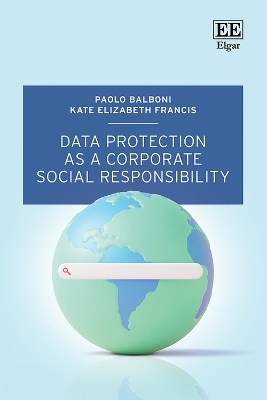
Data Protection as a Corporate Social Responsibility
Edward Elgar Publishing Ltd (Verlag)
978-1-0353-1415-7 (ISBN)
In outlining the debates relating to current data protection structures, Paolo Balboni and Kate Elizabeth Francis argue that legislation alone cannot sufficiently protect individuals’ fundamental rights and freedoms, and instead consider the pressing need for a more ethical approach to data protection. They present the Maastricht University Data Protection as a Corporate Social Responsibility Framework (UM-DPCSR Framework), outlining not only its features, but also how it can fill the gap left by the inadequacies of a merely legal approach to data protection. Balboni and Francis persuasively call on organisations wishing to contribute positively to society through data processing to adopt this framework and to commit to doing good with data or, at the very least, to avoid harming individuals by processing their data.
Data Protection as a Corporate Social Responsibility will be a beneficial read for scholars and students with particular interest in corporate law and governance, human rights, internet and technology law, and privacy. It will also appeal to legal professionals, cybersecurity professionals, and sustainability specialists alike.
Paolo Balboni, Professor of Privacy, CybersecuFinancial Services Law and Distributed Ledger Technology? rity and IT Contract Law and Kate Elizabeth Francis, PhD Candidate, European Centre on Privacy and Cybersecurity, Faculty of Law, Maastricht University, the Netherlands
Contents: PART I INTRODUCTION TO DATA PROTECTION AS CORPORATE SOCIAL RESPONSIBILITY 1 Introduction to Data Protection as Corporate Social Responsibility 2 Corporate social responsibility and related challenges PART II A NOVEL APPROACH FOR THE PROMOTION OF ETHICS IN THE DATA-DRIVEN ECONOMY – DATA PROTECTION AS A CORPORATE SOCIAL RESPONSIBILITY 3 Scope of the UM-DPCSR Framework 4 UM-DPCSR Framework principle 1: Embed data protection, fairness and security in the design of processes 5 UM-DPCSR Framework Principle 2: be transparent with individuals about the collection and further processing of their data 6 UM-DPCSR Framework Principle 3: balance profits with the actual benefits for citizens 7 UM-DPCSR Framework Principle 4: publish relevant findings based on statistical/anonymized data to improve society 8 UM-DPCSR Framework Principle 5: devote a portion of revenues to awareness campaigns for citizens with regards to the data-centric society PART III GOVERNANCE AND IMPLEMENTATION OF THE FRAMEWORK WITHIN ORGANISATIONS 9 Adherence to the UM-DPCSR Framework 10 Conclusion Annex A: UM DPCSR Data Protection Icons for high-risk processing activities Annex B: Complete set of Arts. 13 and 14 GDPR Data Protection Icons for Information Notices Bibliography Index
| Erscheinungsdatum | 07.12.2023 |
|---|---|
| Verlagsort | Cheltenham |
| Sprache | englisch |
| Maße | 156 x 234 mm |
| Themenwelt | Recht / Steuern ► EU / Internationales Recht |
| Recht / Steuern ► Öffentliches Recht ► Verfassungsrecht | |
| Recht / Steuern ► Privatrecht / Bürgerliches Recht ► IT-Recht | |
| ISBN-10 | 1-0353-1415-0 / 1035314150 |
| ISBN-13 | 978-1-0353-1415-7 / 9781035314157 |
| Zustand | Neuware |
| Haben Sie eine Frage zum Produkt? |
aus dem Bereich


